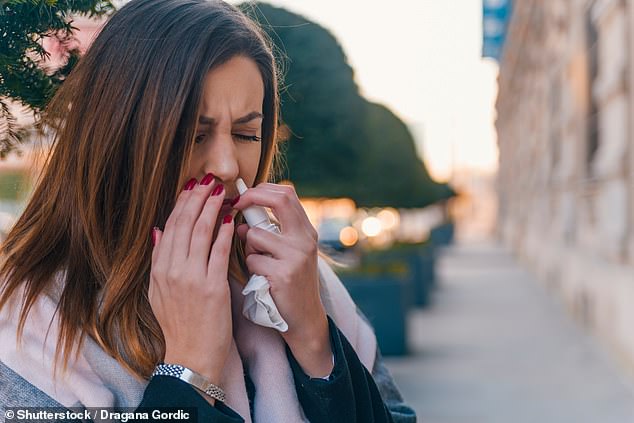Nasal drops containing vitamin A could help Covid patients regain their lost their sense of smell, researchers believe.
University of East Anglia scientists will run a 12-week trial, treating infected people who have lost their smell with nasal drops containing the nutrient.
Experts say the trial builds on a German study showing the potential benefit of the vitamin, and they ‘will explore how this treatment works to help repair tissues in the nose damaged by viruses’.
They hope the treatment ‘could one day help improve the lives of millions around the world who suffer from smell loss, by returning their fifth sense’.

Scientist are recruiting participants for a new medical trial to see if nasal drops containing vitamin A could help Covid patients who lost their sense of smell to virus recover this vital sense (stock)
Anosmia, the medical term for a partial or total loss of smell in a person, is one of the tell-tale signs that an individual has Covid, with those experiencing the problem advised to get a test for the virus and self-isolate.
But anosmia due to to Covid can also be long term, with nearly 5 per cent of Covid patients not recovering their sense of smell one year after being infected.
Those interested in joining the study can seek a referral from their GP to the Smell and Taste Clinic at the James Paget Hospital in Norfolk’s Great Yarmouth.
The study, funded by the National Institute for Health Research, will begin recruiting participants in December.
Vitamin A helps support the body’s immune system as well as keep the skin, and the lining of body parts such as the nose, healthy.
Good sources of the vitamin include cheese, eggs, oily fish and liver.
Men are recommended to have 0.7mg a day and women 0.6mg which is usually achieved through a normal diet.
However, too much vitamin A in a diet can be harmful and damage your bone health later in life.
Pregnant women in particular are advised to avoid having large amounts of vitamin A as it can harm their baby.
French researchers in June found that 96 per cent of Covid patients recover their sense of smell after 12 months.
But they also found that Covid patients had not regained their sense of smell at all in that period, with no time frame on when or if it might return.
What is vitamin A and am I getting enough of it?
Vitamin A, also known as retinol, has several important functions.
These include:
helping the body’s natural defence against illness and infection work properlyhelping vision in dim lightkeeping skin and the lining of some parts of the body, such as the nose, healthy
Good sources of vitamin A include:
cheeseeggs oily fish fortified low-fat spreads milk and yoghurt liver and liver products such as liver pâté
You can also get vitamin A by including good sources of beta-carotene in your diet, as the body can convert this into retinol.
The main food sources of beta-carotene are:
yellow, red and green (leafy) vegetables, such as spinach, carrots, sweet potatoes and red peppersyellow fruit, such as mango, papaya and apricots
How much vitamin A do I need?
The amount of vitamin A adults aged 19 to 64 need is:
0.7mg a day for men 0.6mg a day for women
You should be able to get all the vitamin A you need from your diet.
Any vitamin A your body does not need immediately is stored for future use. This means you do not need it every day.
Can you have too much vitamin A?
Some research suggests that having more than an average of 1.5 mg a day of vitamin A over many years may affect your bones, making them more likely to fracture when you’re older.
This is particularly important for older people, especially women, who are already at increased risk of osteoporosis, a condition that weakens bones.
Having large amounts of vitamin A can harm your unborn baby. So if you’re pregnant or thinking about having a baby, do not eat liver or liver products, such as pâté, because these are very high in vitamin A.
Source: NHS
Advertisement
Source link : https://www.dailymail.co.uk/news/article-10040373/Vitamin-nasal-drops-help-Covid-patients-recover-sense-smell-scientists-say.html











